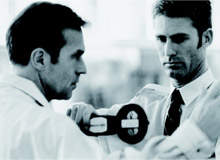
From the initial emergency procedures put in place following 9/11 to the current restrictions on carry-on liquids, aviation security has remained firmly in the public consciousness over the last six years. Under intense scrutiny, the industry continues to debate how to respond to perceived threats to aircraft and airports on a global scale.
In Europe, part of the challenge has been coordinating a harmonised response to security threats that sets common standards for member states but also provides a framework for progress towards those standards. The first step was the adoption of Regulation 2320 / 2002, which established common rules for civil aviation security. In the past four years, member states have had to adopt the standards laid down in this legislation and create programmes to attain them.
“9/11 was the start,” explains Robert Missen, deputy head of unit aviation security for the European Commission. “Before that there were no harmonized rules at European level. Regulation 2320 was only adopted in early 2003, so we have only had four years, but progress has been good.”
Regulation 2320 covers many aspects of airport security and planning, aircraft safety and screening of staff, cargo and passengers. Its goal is to ensure the same high levels of protection for citizens throughout the EU, ensure that fair competition between operators is not undermined by failings in security and coordinate information across the EU to enable the early identification of threats and gaps in security provision.
The importance of implementing this legislation post-9/11 is underlined by the powers given to Missen’s department to ensure that member states take the regulations on board. “We can carry out inspections,” he says, “but it is rare to have these powers, which is potentially a sign that this is not a mere exercise but part of the day-to-day operations of airports.”
REGULATION IMPLEMENTATION
How well do you really know your competitors?
Access the most comprehensive Company Profiles on the market, powered by GlobalData. Save hours of research. Gain competitive edge.

Thank you!
Your download email will arrive shortly
Not ready to buy yet? Download a free sample
We are confident about the unique quality of our Company Profiles. However, we want you to make the most beneficial decision for your business, so we offer a free sample that you can download by submitting the below form
By GlobalDataPolicing implementation is no easy task. The EU has over 500 airports, so it is only possible to evaluate a small sample, but some 20 airports are inspected each year. These represent a cross-section in terms of geography and types of facility, though for obvious reasons the big international airports are given priority. Inspectors also visit the relevant ministries to check on the political and administrative efforts in each state.
Regulation 2320 also allows member states to go beyond the agreed standards for particular airports or particular flights, though it also recognises that smaller, more remote airports have different needs from large international hubs such as Heathrow or Frankfurt. No anti-competitive practices should be allowed to develop as a result of the legislation, such as foreign carriers facing a heavier security requirement than domestic carriers.
“We set baseline standards, but threats may vary from state to state, day to day and flight to flight,” observes Missen. “El Al flights, for instance, may be more under threat. We stay out of the threat and risk analysis. Member states deal with that at their own level.”
The redrafting of Regulation 2320, currently underway, is a sign that progress towards harmonisation has gone well so far. It further suggests that the industry and the EU have together developed a mature setting in which to consider provisions for aviation security. “It was drafted hurriedly after 9/11 and has been in use for four years, so it needs to be overhauled,” notes Missen. “In our view, it is too detailed.”
REGULATORY RESPONSE
A key priority is to simplify the process of making changes to the legislation. Amendments currently take around two years passing through the European Council and other bodies. While thoroughness is necessary when amending any legislation, the pace of technology development and the potential for new threats to evolve rapidly put Regulation 2320 in danger of falling behind. The regulatory response needs to move at the same rate as the industry itself.
The second goal is to address the level of detail made public. “The more there is in the framework document, the more is in the public domain, which we don’t want to see for obvious reasons,” remarks Missen. “The new version is in the second reading now and will set general parameters. Then we will have more detailed implementation rules, which are not in the public domain and can be adapted in a matter of months.”
Governments and companies operating airlines and airports will still be given the latitude to implement measures as they see fit. “More flexible rules benefit both us and the industry,” notes Missen. “So far we have been adding rules, but now we are in a mature situation to sit down with the industry to look at where the regulations might be relaxed.”
The redrafted legislation needs to maintain the current high level of motivation and engagement among member states, and extend this further to the wider industry. If it can do this, Europe will have taken another giant step towards a regulatory framework that delivers the high standards of security required in today’s volatile world.







